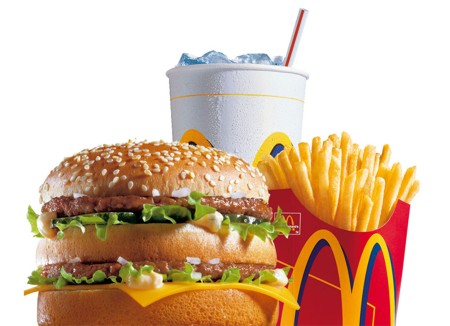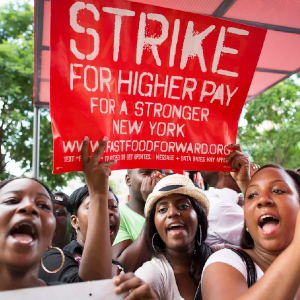California restaurant ops want to block a law boosting Fast Food workers’ wages. State legislators passed the law last month, but the resto proprietors are now asking for a referendum to decide the issue. They say such a raise could be disastrous for them…
 The classic Big Mac Meal Deal: A Big Mac alone now costs avg.
The classic Big Mac Meal Deal: A Big Mac alone now costs avg.
(US)$6.35. Could rise to $12.00, critics of a new minimum
wage increase for California Fast Food Workers warn…
Mega-boost in wages polarizes Fast Food world
Not long ago, we reported that Governor Gavin Newsom has signed a new bill providing a minimum wage hike for Fast Food workers to at least $22.00 an hour. That would put California at the forefront of what some call a progressive movement to pay Fast Food workers ‘a living wage’.
Fast Food worker wages in California currently average $8.80 an hour, or $18,101.00 per year. But that could rise to as much as $22.00 an hour starting next year if legislation recently passed by the CA legislature becomes law. By comparison, the overall minimum wage in Cali is currently at $15.00 per hour.
According to The Wall Street Journal, Major quick-service brands Chick-Fil-A, Jack in the Box, Burger King, Chipotle, and In-N-Out spent more than $1 million in lobbying efforts against the current bill. And The International Franchise Association has spent $615,000 in opposition.
More than just wages
The new law would also establish a council that would have the power to set minimum standards for wages, hours and working conditions in California. No further legislation or input from the pubic or industry reps would be needed, to make future changes.
Girding for war
According to an Associated Press story filed a few days ago, a new industry group has emerged calling itself Protect Neighborhood Restaurants. The coalition is co-chaired by the International Franchise Association and the National Restaurant Association. But it includes small business owners, restaurateurs, franchisees, employees, consumers, and community-based organizations.
The group warns that, “The law will raise consumer costs, isn’t needed, and will create ‘a fractured economy’ with different regulations for different types of restaurants, objected the coalition.”
What they don’t say outright is that higher menu prices would drive consumers away from their doors – a potential disaster for them.
Another approach
The coalition filed a referendum request that would block the bill, at least temporarily. The vote could be included on the ballot for the mid-term elections later this fall. No indications yet whether the question will, in fact, be put to the voters.
My take
I initially wondered why it’s taken so long for the resto industry to organize against the revolutionary, potentially ruinous wage hike. The coalition’s statement that consumers would face huge price hikes seems to me an understatement. Not only would wages go up; benefits, payroll taxes and other payroll deductions would rise, too.
Critics of the hike predict that the average price of a Big Mac in the U.S. – now $6.39 – might have to rise to $12.00 or more to cover the cost of the proposed Cali wage hike. How many high school kids can afford that? More to the point, how many would stand for such a slap in their faces (or wallets)? Higher prices are one thing. What some customers might see as an insult, or a lack of appreciation, or even a lack of respect by the Fast Food industry would be something else entirely.
Will the Fast Food industry change dramatically as a result of such wage hikes and food price inflation? It’s already happening. And was happening even before COVID shock-collared the industry into coming up with bold new business models. Future-store concepts emphasizing delivery, drive through and automation (to reduce staffing needs) have been brewing for almost a decade.
Will the eating habits of the young and convenience-addicted change markedly if Fast Food menu prices continue to soar?
The question of ‘a living wage’
And… The question of fast Food jobs paying ‘a living wage is actually moot. Let’s not forget: the Fast Food sector was never meant to be a career path for millions who would start at the bottom and eventually rise to become franchisees themselves. Only a very few ever achieve that pinnacle of success.
McDonald’s has long held that their jobs are designed to be places where kids can get their first real jobs, develop a healthy work ethic, and make money to help them fund their future education. As it turns out low-level McJobs have also allowed older workers work part time in retirement augmenting their fixed, pension-based incomes. And many middle-aged folks look on McDonald’s as a place they can work part-time, on flex hours, to bring a second income into the home.
Muse on that…
~ Maggie J.

